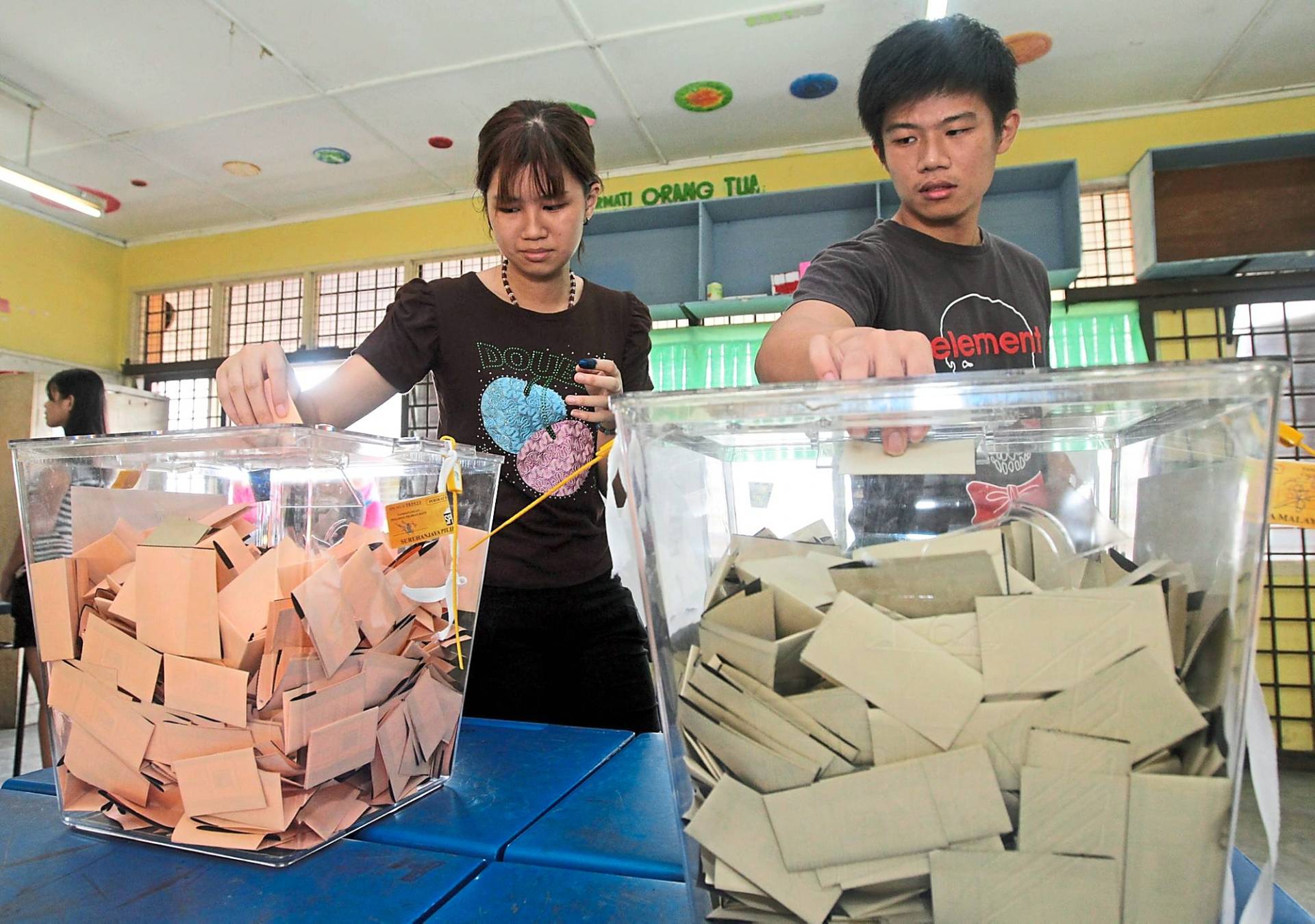
Youth power: The next election will feature voters even younger than these young adults casting their ballots in a previous general election. — Filepic
THREE years from now could seem a lifetime in this fast-paced world we live in, but 2022 isn’t that far off, especially with our Parliament members passing the Bill for Malaysians aged 18 and above to vote in the next general election.
A 15-year-old kid today will reach that age by then, and that young adult will have the power to dramatically influence political changes. They can also run for MP or state assembly positions by 2023. But most importantly, is the current democratic landscape prepared for such a paradigm shift?
The key concern is, how many of our existing political parties are ready to deal with the aspirations and wishes of these eight million new voters, who are expected to be automatically registered in the electoral rolls over the next five years?
The line-up of our present leadership is chockful of Baby Boomers, those born between 1946 and 1964. Gen Xers come next, and then the Millennials (Gen Y). Gene-ration Z is the newest to be distinguished and applies to those born from 1997 onwards.
Besides these super millennial voters, there are also the 3.9 million 21-year-olds who haven’t yet registered to exercise their democratic rights.
The government expects this change to increase the total number of voters to 22.7 million by 2023, compared to the 14.9 million in GE14, reads a Bernama report.
So, political parties which want to capture the hearts and minds of our young voters must design programmes that matter to them. And they’re best served using non-formal political structures to reach out to them, too.
The bulk of our current politicians, who range from being in their 50s to 90s, are not tuned in to the frequency of the young, resulting in a lack of empathy between the two generations.
Some of these know-it-alls just don’t know how to release the reins of power and retire rest assured of the younger generation’s abilities.
As much as our founding fathers must be recognised and treasured, rolling out the history of our Merdeka era leaders won’t help win votes – that’s fact. They are ideal for National Day fanfare but matter little in an election campaign.
Young voters, or any voter, for that matter, would want to know what their candidates can do for them, and not what party leader contributions to the cause constitute, even if track records matter.
The truth is, Malaysia desperately needs to see the faces of more young leaders at all levels. But for whatever reason, we seem to give the impression we are short of young heroes.
We still, understandably, talk about the late P. Ramlee, Mokhtar Dahari and Sudirman Arshad, but our global names are confined to Jimmy Choo, Michelle Yeoh, Nicole David and Lee Chong Wei.
Where are our Malaysian icons, and why are they not on international platforms proudly representing our country?
Hopefully, we will see young political leaders aged between 18 and 25 soon, if not by the next general election.
If our political parties twiddled thumbs in their pursuit for new talent, we’re likely to continue seeing the same old faces, literally, and that’s not going to entice this large group of young voters.
Previously, Malaysia’s youngest MPs were former PM Datuk Seri Najib Razak and Batu MP P. Prabakaran, who were elected at 22 years old.
The youngest MP currently is Youth and Sports Minister Syed Saddiq Abdul Rahman, who joined the Cabinet at 25.
The Bill to allow 18-year-olds to vote would mean putting pressure on the government and MPs to address issues such as education, job opportunities, housing and public transportation.
Climate change and the environment are important concerns for the young, too.
Singapore unequivocally backs its younger generation’s concern on climate change, a problem with major implications for billions of people if not slowed down.
“We are on their side, because this is something that is going to happen in their lives and is going to affect them.
“It is very much something in young people’s minds – this demonstration of young people around the world,” said Singapore Prime Minister Lee Hsien Loong.
It’s good we have an Energy, Science, Technology, Environment and Climate Change Ministry, but not great that it isn’t part of regular dialogue among the seniors. This is where our politicians have second-guessed our young ones in them having become more mature, politically aware and well-informed.
If our politicians spent more time listening instead of talking and plotting, they would learn more.
The Hong Kong protest is a textbook lesson. The country’s leaders refused to communicate with the young, who consequently demonstrated the intensity of their power.
We can choose to support or condemn them, but no one can argue that they have shown that they are a force to be reckoned with, and their votes certainly count.
This wakeup call to be more appealing isn’t limited to politicians, and should involve the media, too. None of the current media can cover themselves in glory for having been the voice of these new voters.
Media with youth platforms would be able to reach out to their peers more effectively, though.
In an age where the young (and even old) share content they believe in on multiple platforms, political and media stakeholders clearly have their work cut out.
Ultimately, they had better be ready to face the country’s most unprecedented general election ever.





